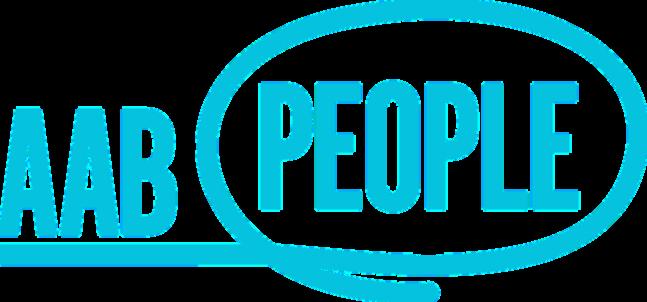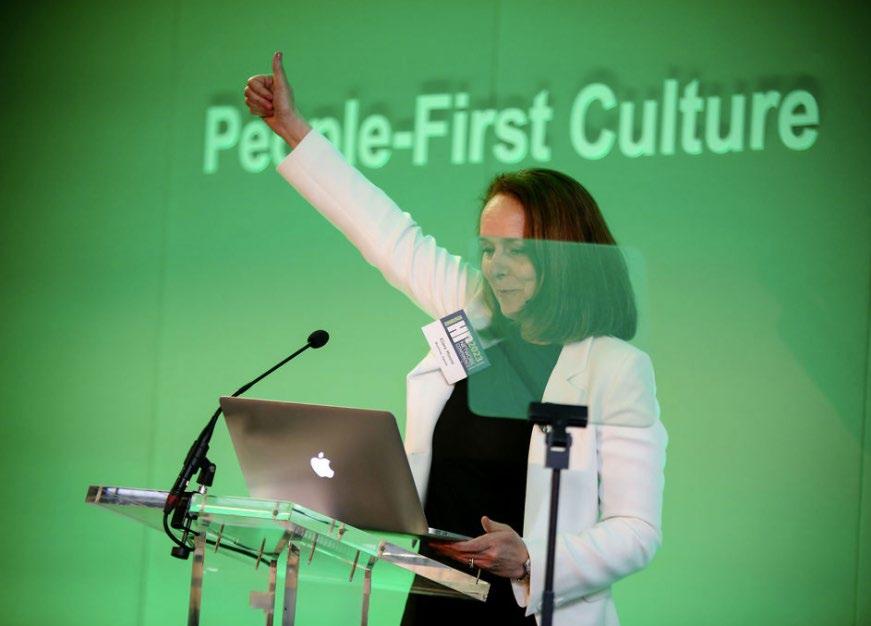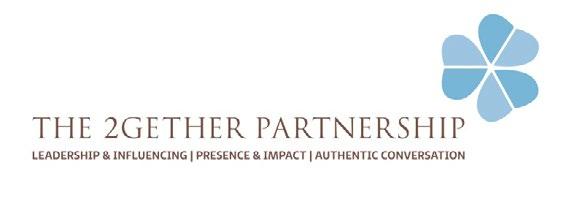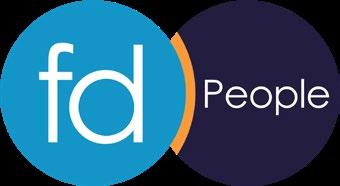
JULY 2023 VOLUME 19 ISSUE 6 A MEDIA AVENUE PUBLICATION | www.hrnetworkjobs.com SPECIAL FEATURE: HIRING FOR ATTITUDE, TRAINING FOR ABILITY
The Accidental
Accidental
BLESSING OR CURSE?
Manager: The
Manager:

2 unique experiences
an experience, like no other
Our newly renovated showroom is open and ready to be rediscovered. We recently embarked on an incredible transformation to create a space that celebrates heritage whilst innovating with contemporary design.

hamiltonandinches.com
COVER STORY
The Accidental Manager: Blessing or Curse?
Accidental Managers are often considered a Persona Non Grata inside organisations. But can HR mould these pseudo colleagues into management material? Andy Moore examines the pros and cons of this increasing phenomenon and asks is an accidental manager a blessing or a curse?

16
4
CONTENTS





8 8 News 14 Employment Law Update A range of updates from the world of employment law 20 Stats The Sound of Silence –Quiet Office Quitters 22 Feature Two Review of the Hr NETWORK Conference & Exhibition 2023 28 The Bookshop Latest bestsellers to the published 30 Feature Three Preview of Categories and Sponsors in the Hr NETWORK National Awards 2023 34 Special Feature Hiring for Attitude, Training for Ability 38 Extra Unsupported Grief in the Workplace 42 Insights Accidental Manager; Org Values and Behaviours; L&D Strategy, Gender Knowledge Hiding 46 My LinkedIn Paul Bridges, Towergate Health & Protection 38 42 22 34 CONTENTS 5
Lois McMurtrie AAB People
Employment Law Update Mental Health Reasonable Adjustments
p. 14
Daisy Hooper CMI (Chartered Management Institute)

Insight: Addressing the Challenge of Accidental Manager p. 42
Owen Cook The Culture Builders
Insight:
Embedding Org Values & Behaviours
p. 43
Dominic Fitch Impact International
Insight: How to Create a Learning and Development Strategy p. 44
Dr. Paola Zappa University College London
Insight: Gender Knowledge Hiding p. 45
Founder and Publisher: Lee Turner lee@hrnetworkscotland.co.uk
Senior Associate Editor: Andy Moore editor@hrnetworkscotland.co.uk


Deputy-Editor: Teresa Flannigan editor@hrnetworkscotland.co.uk

Editor-At-large: Neil Archibald editor@hrnetworkscotland.co.uk
Editor’s Assistant/Admin: Marion Robertson editor@hrnetworkscotland.co.uk

Advertising/Sponsorship: Donna Turner advertising@hrnetworkscotland.co.uk
Design: Media Avenue Ltd
Hr NETWORK now available on:
LinkedIn: uk.linkedin.com/in/ hrnetwork1
Twitter: www.twitter.com/ HrNETWORKNews
YouTube: www.youtube.com/ user/hrnetworkscotland
Media Avenue Limited
18 Young Street, Edinburgh, EH2 4JB 0131 625 3267
www.hrnetworkjobs.com
www.mediaavenue.co.uk
The views expressed in Hr NETWORK (SCOTLAND) are those of invited contributors and not necessarily those of Media Avenue Ltd. Media Avenue Ltd does not endorse any goods or services advertised, or any claims or representations made in any advertisement in Hr NETWORK (SCOTLAND) magazine and accepts no liability to any person for loss or damage suffered as a consequence of their responding to, or placing reliance upon any claim or representation made in any advertisement appearing in Hr NETWORK (SCOTLAND)magazine. Readers should make appropriate enquiries and satisfy themselves before responding to any such advertisement or placing reliance upon any such claim or representation. By so responding or placing reliance readers accept that they do so at their own risk. © Media Avenue Ltd. 2023.
6 CONTRIBUTORS
July 2023
Welcome to our July 2023 issue of Hr NETWORK Magazine. As is always the case when I write my Publishers Welcome for the July issue, I always feel a bit de-mob happy with our pending summer break coming up very soon and looking forward to a nice well- earned break, as I am sure all the Hr NETWORK team are.
We have a busy few months coming up with the Judging process for this years’ Awards 2023 in partnership with Roffey Park Institute, which will include the initial scoring stage over the months of July and August and from there the Judges will be able to announce their shortlisted finalists.
The interviews for finalists will take place in mid-September and the winners will be announced at the Gala Dinner in Glasgow on Thursday 9th November.
Hr NETWORK Conference & Exhibition 2023
The Hr NETWORK Conference & Exhibition 2023, which took place at the magnificent BT Murrayfield Stadium was a huge success following some incredible feedback from delegates, sponsors and exhibitors.
The feedback from delegates, sponsors and exhibitors has been incredible and the biggest challenge of all will be to have an even bigger and better Conference & Exhibition again next year.
This Issue
In this online edition of the magazine, Andy Moore takes a closer look the impact made from Accidental Managers and asks if they are a curse or a blessing.

The regular sections of the magazine include: Stats, the Bookshop and a range of Insight features on some hot topics in the people management & development world.
I hope you enjoy your online copy of Hr NETWORK Magazine and look forward to welcoming you to some of our remaining events this year.
Lee Turner Publisher
Contributors: Louise McMurtrie, Daisy Hooper, Owen Cook, Dominic Fitch, Dr. Paola Zappa.
7
WELCOME
New research from ScottishPower identifies a trend of ‘boomerang employees’ returning to previous jobs as the UK labour market stabilises
The research conducted by YouGov suggests that the grass isn’t always greener when it comes to changing jobs, with two-thirds (63%) of those who regret leaving a job confessing their new role isn’t what they expected it to be. A third (34%) miss the people they worked with.
ScottishPower is welcoming former employees back as part of its biggest ever recruitment drive, with up to 1,000
Phoenix Group trio named as DE&I champions on Empower Role Model lists
Rakesh Thakrar, the Chief Financial Officer for Phoenix Group, has been named on the Empower Top 100 Executives Role Model list for his work in promoting social mobility, diversity, equity, and inclusion (DEI) in the workplace.
In addition to Rakesh’s inclusion on the Executives Role Models list, Client Relationship Consultant, Rabya Aktar and Business Development Manager, Imran Khan, were named on the Top 100 Future Talent list in recognition of their work in as co-founders of Phoenix Group’s network for ethnically diverse colleagues, Mosaic, and their work to drive DE&I both in and outside the company, including work with Scottish government.
The 2023 Empower Role Model Lists, supported by YouTube, represents the wide range of impactful and innovative work being done by organisations across different countries and industry sectors supporting inclusion in the workplace. This recognition celebrates the diverse range of inspiring individuals who have made it their personal mission to removing barriers for ethnically diverse employees to help them on the pathway to success.
Phoenix has made great strides in the field of DE&I in recent years, it published its first Ethnicity Pay Gap report in April and is on course to achieve its targets to increase the percentage of staff who come from a black, Asian or

green jobs on offer as part of the company’s record £10billion investment into the UK. The roles range from accountants and project managers to ecologists and engineers. They are all key to meeting the nation’s ambitious climate goals and are open to previous employees as well as new recruits.

Sarah McNulty, HR Director at ScottishPower, said: “These new findings show there’s no issue in making a comeback at an old employer. A surprising number of people are returning to their former workplace, either slotting back into their old job or using the skills they’ve picked up in the time since leaving to take on a new challenge.”
ethnic minority background to 13% in 2023. It is also committed to increasing the number of women who hold senior positions in the business.
In addition Phoenix is committed to delivering change through its social mobility strategy and as a result of the work it has done to date has risen from number 41 to number 23 in the Social Mobility Index between 2021 and 2022.
The company’s social mobility strategy takes an intersectional approach across all disadvantaged groups, work includes ensuring recruitment adverts are free from bias, working with job centres to attract people from groups that are often excluded from employment, creating a programme to recruit over 50s from lower socio-economic backgrounds, supporting the 10,000 black interns initiative and, underpinning all the initiatives, having a data analysis programme to capture and assess diversity data.
Phoenix’s commitment to foster a diverse, inclusive, and equitable workplace includes a broad range of on-going and emerging programs designed to attract, retain, and support talent at every stage of their career.
As part of the group commitment to specifically improving racial/ethnic diversity, equity and inclusion – we have created a DEI Project Lead – Race & Ethnicity role to bring a critical focus in ensuring the whole business can move the dial holistically in this space
NEWS
8
Business leaders identify HR as ripe for disruption by AI
Amidst tough economic conditions, business leaders see the potential for AI and automation to revolutionise HR and make businesses more efficient. But leaders will only be successful if they keep HR’s human touch.

That’s according to new research from Personio, Europe’s leading HR software company for small and mid-sized businesses, which surveyed 500 C-suite level executives and 1000 HR decision makers at SMEs in the UK and Ireland. The data reveals that with nearly three quarters (74%) of business leaders reporting there is a need for their business to become more efficient and productive, two thirds (66%) believe AI and automation have a lot of potential to deliver this within the HR department.

Three in five (60%) business leaders intend to incorporate more AI and automation into their HR department in the next 5 years. And, in light of recent technological advances with generative AI, like Chat GPT, a similar number (61%) even believe HR will be taken over by AI in the future.
However, these sweeping statements about the future of HR may be a symptom of a basic misunderstanding of the value that HR teams deliver to organisations. In fact the survey uncovered a clear knowledge gap, with two thirds (67%) of business leaders admitting they’d like to have a better understanding about what their HR team does.
Ross Seychell, Chief People Officer at Personio, comments: “Emerging technologies such as generative AI tools, like Chat GPT, have the potential to revolutionise workplaces, and the HR department is no exception. But will HR be ‘replaced’ one day by AI? I certainly don’t believe so, and the business leaders that say it is possible are short sighted and worryingly misinformed about the role that effective HR plays in businesses. Instead we can expect to see AI make HR more important, by allowing a hard-pressed department to focus more on business critical issues like building a great culture or solving retention challenges, while new technology will make admin tasks more efficient.”
NEWS
There’s been no shortcut to this point, but you did it! Your new job is a reality. Your thoughts now turn to how you make the right impact from day one. Your First 90-Day Roadmap™ allows you to manage your entry into a new role. It provides a structure that will help you get started, enhance your chances of success and saves you time. Visit www.befutureready.today and find it in Roadmaps. Your First Roadmap™ 90 Days 9
One in five HR workers expect to switch jobs this year
New research by HR software provider Ciphr has found that around one in five (22%) people working in HR in the UK are considering leaving their organisation within the year.
Ciphr’s survey of 163 HR and people management professionals – working mainly in administrative or middle-management positions – revealed that one in 10 people were actively job hunting and very likely to change employers, and one in eight (12%) were likely to; and intended to seek another position.
A further 44% said they would be open to moving jobs but it was unlikely and they’d currently made no plans to do so. The remaining third (34%) of those polled were reportedly happy to stay put for at least the next 12 months.
Among those who said they were likely or very likely to change employer, the most common reason cited was lack of job growth. Two-fifths (42%) of HR workers said they wanted more career progression, management
Must-have skills that employers are searching for
New research shows that it is the soft, transferable skills that are being championed by employers across the UK.
In a recent study, 13.3% of businesses surveyed by the ONS reported experiencing a shortage of workers. Since then, to improve the situation, companies have had to reform the skills that they prioritise from applicants to ensure positions are being filled by the best candidates. Search data also suggests that Brits are looking for more guidance than ever before when it comes to their CV, on TikTok #ukcvtips has over 90k views [92,500] and Google searches for ‘CV Tips’ have spiked 89% in the last month.
Early career website, RateMyPlacement, analysed internal data from 2017 to March 2023 to reveal the most commonly cited skills required within jobs on their website.
responsibilities, or promotion opportunities than they were currently being offered.
A similar number (39%) were also looking to make a change to improve their work-life balance. Perhaps surprisingly, given the impact of the rising cost-of-living on wages, seeking a higher salary was only the third most popular reason for wanting to move to a new organisation, with just under a third (31%) of survey respondents reportedly feeling underpaid.
Poor leadership, which can greatly affect an individual and team’s performance, morale, and engagement, was also a concern for a quarter of those contemplating quitting their jobs.
Overall, HR workers aged between 35 and 44 years old appear, at least statistically, the most likely to be discontent with their current roles. Nearly a third (30%) of this age group, compared to one in seven (15%) 25-to-34year-olds, and one in five (20%) of the over 45s, were likely or very likely to be seeking alternative employment.
The result revealed:
• communication skills as the most important, required for 45% of job adverts
• This was followed by organisational skills at 36%
• and innovation in third place at 29%
Other skills employers found valuable included analysis skills [24%], good initiative [21%], confidence [12%] and problem-solving skills [10%].
Career expert and RateMyPlacement co-founder, Oliver Sidwell, shares tips on improving transferable skills and how to put these skills on your CV, “Making an effort to consolidate your soft skills is becoming more and more incremental to future career prospects as we become a more remote, digital workforce and as industries become more people-orientated. It’s also these traits that are transferable from industries, positions and roles, making individuals more well-rounded and much more attractive to employers.”
“By doing this you’ll be appealing to the majority of employers who believe graduates with work experience under their belts have the required soft skills to be successful.”
NEWS
10
9% increase in ESG investment funds, as Europe leads the way
Market analysis by digital identity security specialists, ID Crypt Global, has shown that Europe is leading the way when it comes to the number of ESG investment funds, although Asia, Australia and New Zealand have shown the largest degree of growth.
ID Crypt Global analysed the latest data for Q1, 2023 on ESG investment funds, encompassing open-end funds and exchange-traded funds that claim to focus on sustainability; impact; or environmental, social, and governance factors.
The figures show that globally, there are some 7,030 ESG investment funds currently in operation, with an estimated asset value of $2.745m. While the total number of funds has increased by 9% annually, the total asset value of these funds has fallen by 1.2% versus last year.

In terms of the total number of funds, Europe ranks top by quite some margin, with the 5,410 current funds accounting for 77% of the global total, having increased by 9.1% year on year.
Europe also tops the table in terms of the total value of ESG investment funds, with assets worth an estimated $2.296bn, having also increased by 1% year on year.
However, while Europe may be the dominant force where ESG investment funds are concerned, it’s Asia (excluding Japan) that has seen the strongest growth in numbers, up 39.6% versus Q1 of last year.
Australia and New Zealand have also seen stronger growth in the number of funds when compared to Europe, up 31.4% annually, as has the United States with a 15% increase.
Japan is the only region to have seen a decline in this respect, with total fund numbers dropping by 72% annually, from 214 to 60.
However, when it comes to the largest annual increase in the value of ESG investment fund assets, it’s Canada that ranks top. While the total number of Canadian ESG investment funds has increased by just 1.5% in the last year, the total asset value has climbed by 15.4%.

NEWS
T: 0141 221 2984 E: aabpeople@aabgroup.uk www.aabpeople.com Get in touch HR & Employment Law Health & Safety Payroll Expert Tailored Support in Contact us for a FREE no obligation consultation. 11
Sickness absence recording at its lowest level in four years
Although 80% of employers currently record sickness absence, that leaves a fifth (20%) who do not according to new research from GRiD, the industry body for the group risk sector. In addition, 59% record the impact of sickness absence but 41% do not.
The 2023 figures show a clear drop in the number of businesses that record sickness absence and its impact, which is likely to be because the onset of hybrid working has made it much more difficult for employers to record this data. Absence is simply less visible in a hybrid-working world, and, coupled with the difficulty in collecting the data, some employers may have just stopped collating the figures.
Katharine Moxham, spokesperson for GRiD, said: “It’s important that employers understand that measuring sickness absence is not a draconian measure with which to hold employees to account, it’s about spotting patterns in the employee population as a whole.
Half of adult victims are bullied in the workplace
Research by flexible study providers, DLC Training reveals there has been a 81% increase in online searches for ‘bullying at work’ in the past month. Figures from YouGov show that of adult bullying victims over half (56%) were bullied by a boss or manager, with 47% revealing they had faced bullying at the hands of a colleague.

With the workplace at the centre of Britain’s adult bullying crisis, HR Experts from DLC Training share their tips to recognise and deal with workplace bullying. HR tutor and expert Neil Finegan explains: “Bullying in a professional environment can take many forms which can often make it difficult to spot. While verbal and physical abuse can be easy to identify in the most extreme cases, more subtle signs to look out for include sabotage or exclusion” as Neil explains.
“If you feel like a colleague is constantly undermining your work, whether that by withholding important information that you need to do your job or simply blaming you for their mistakes these can be early warning signs of bullying.
Document recurring incidents in detail including date, time, location and a description. If the issues continue then you should speak with someone you trust on your team to raise your concerns.
When reasons for absence are understood, it’s possible to implement an employee benefits framework that offers effective support. Putting the case to expand or change the support becomes more challenging without being able to quantify absences and the impact they are having.”
Of those businesses who do understand the benefits of documenting the impact of staff sickness, recording the number of lost hours or days was the most favoured method (46%), followed by calculating the cost of lost productivity (39%). Thirty eight percent analyse indirect costs - such as colleagues covering work, learning time, management time; 37% calculate the cost of sick pay provision e.g. Statutory Sick Pay and salary costs; 30% estimate costs related to presenteeism/leavism, and 29% look at the direct costs such as for temps and agency fees.
Katharine Moxham concluded: “Absence management is best tackled when employers have a good handle on their data and workplace issues such as stress or long hours can be managed when this is discussed at regular intervals with their adviser and insurer. There’s a great deal of support embedded into employee benefits, and advisers and insurers will be best-placed to advise how that support can be applied to support employees before they go off sick and to increase successful returns to work.”
“Exclusion plays a big part in workplace bullying. If you’re feeling excluded from important meetings or events then this can lead to feelings of isolation making work feel unbearable. This can even extend to being left off of important emails, which make it difficult to stay in the loop.
If you feel comfortable, try talking to the person who is isolating you first of all or go to your supervisor for advice. They should help you facilitate better communication and support on any further challenges as they arise.
NEWS
12
ROFFEY PARK INSTITUTE

ANNUAL OD CONFERENCE 2023
OUR SPEAKERS
Post-COVID, the world is disrupted and priorities have shifted. Business models of the past are no longer fit for the future and organisations find themselves in endless cycles of change to generate growth as well as create a culture where employees want to work, and which is profitable and sustainable.



• How do you deal with your people’s changing expectations of work, while attracting, developing and retaining talent?

• What brave decisions do leadership need to make in order to survive and thrive in our disrupted world?

• What would be the positive impact of fostering a culture of trust, innovation and psychological safety in your organisation?
hello@roffeypark.ac.uk
www.roffeypark.ac.uk/contact
NEWS
GERVASE BUSHE
CHRIS MOWLES
NEIL MULLARKEY
LINDA HOLBECHE
GRAHAM CURTIS
Join us to explore these questions and more 13
NEW GUIDANCE ON MENTAL HEALTH REASONABLE ADJUSTMENTS RELEASED BY ACAS
 By Lois McMurtrie AAB People
By Lois McMurtrie AAB People
Around 1 in 4 people in Scotland are affected by a mental health condition in their lifetime and in 2022, around 18.5 million sickness days were taken for the reason of a mental health condition. Recent studies have also suggested employees will often mask mental health related sickness with another reason due to existing stigmas, meaning this figure could be significant higher still.
Mental health can be a disability under the Equality Act 2010, where it has a substantial and long-term effect on the ability to perform day-to-day tasks. However, even if the mental health condition an employee is suffering from is potentially not considered to be a disability under the Act, many would argue that as part of being a supportive and mindful employer, treating the condition as such can only be beneficial.

In April 2023, ACAS published guidance on making reasonable adjustments for mental health. This landmark initiative aims to foster a more inclusive and supportive work environment for employees
experiencing mental health challenges. The ACAS guidance provides practical advice for employers on making reasonable adjustments to accommodate employees’ mental health needs, ultimately benefiting both individuals and organisations as a whole.
Reasonable adjustments are measures made by employers to accommodate employees with disabilities, including mental health conditions. The Equality Act 2010 in the UK requires employers to make reasonable adjustments to support employees’ physical and mental health needs, thus ensuring equality of opportunity in the workplace. ACAS’s new guidance emphasises the importance of applying the same principle to mental health conditions as with physical disabilities, highlighting the need for employers to take proactive steps in creating an inclusive work environment.
Reasonable adjustments are different for everyone depending on the job they do, where they work and for them as an individual as what works for one person may not work for another. Reasonable adjustments may
EMPLOYMENT LAW UPDATE
In this latest Employment Law Update, we take a look at recently issued guidance from ACAS on how to make reasonable adjustments for mental health conditions.
BULLYING & HARASSMENT DATA PROTECTION DISABILITY DISCIPLINE & GRIEVANCE DISMISSAL EMPLOYMENT TRIBUNALS 14
also change over time, as if there are changes in an individual’s health the support they need may alter too.
The guidance from ACAS is practical advice which discusses examples of reasonable adjustments, managing requests from employees and other policies which you can review with employees in mind.
Some key elements of the guidance include:
• Encouraging employers to raise awareness of mental heath issues amongst employees, promoting understanding, reducing stigma and encouraging open conversations
• Awareness and Education: Encouraging employers to raise awareness of mental health issues among staff, promoting understanding, reducing stigma, and encouraging open conversations
• Flexible Working Arrangements: Recognising the benefits of flexible working hours, remote work options, and job-sharing arrangements to help individuals manage their mental health effectively
• Supportive Policies and Procedures: Recommending the implementation of policies that clearly outline how mental health issues will be handled
within the workplace, ensuring confidentiality and providing access to appropriate support services
• Communication and Line Management: Emphasising the role of line managers in fostering a supportive culture, promoting regular communication, and offering guidance on supporting employees with mental health conditions
• Return-to-Work Support: Offering guidance on managing employees’ return to work after a mental health-related absence, including phased returns, reasonable adjustments, and support networks

• Reasonable Adjustments: Highlighting specific adjustments that can be made, such as providing additional training, modifying workload or responsibilities, adjusting workspaces, or offering reasonable time off for appointments
It is pleasing to see practical guidance of this nature issued from a key source such as ACAS, as this is a positive step towards enhancing the capabilities of individual employers to cope with and support their workforce on the frontline of mental health. It is often the case that management are apprehensive when mental health is
raised by their team as something individuals may be struggling with. Often this is because line managers feel ill equipped to provide any supportive measures, but also because they worry about saying the wrong thing and potentially making the situation worse. Each of the proposed measures highlight the relevance of mental health in a modern workplace and work towards building a framework for management to hold open conversations and implement adjustments where appropriate.
What are the benefits and impact in practice? The introduction of ACAS’s guidance on mental health reasonable adjustments brings several benefits to both employees and employers. By implementing these recommendations, employers can enhance productivity, reduce absenteeism, and retain valuable talent within their organisations. In addition, supporting employees’ mental health needs fosters a positive work environment, improves morale and job satisfaction, and contributes to the overall wellbeing of the workforce. All of these measures take vital steps in helping to ensure employers stay clear of falling short of their legal obligations, erring on the side of caution in relation to the Equality Act 2010 and providing a clear indication that mental health support is taken seriously by the organisation.
EMPLOYMENT LAW UPDATE
HEALTH & SAFETY MATERNITY & PARENTAL RIGHTS REDUNDANCY TERMS & CONDITIONS OF EMPLOYMENT TUPE WORKING TIME 15
The Accidental Manager: The Accidental Manager:
BLESSING OR CURSE?
Accidental Managers are often considered a Persona Non Grata inside organisations. But can HR mould these pseudo colleagues into management material? Andy Moore examines the pros and cons of this increasing phenomenon and asks can it be risky for business

FEATURE
Accidental Accidental

FEATURE
Optimistically, it would be enlightening to paint a rosy picture of “freedom of opportunity” for all, but with only one in five line managers rated highly inside organisations, the decision to appoint them can be a gamble. The Chartered Management Institute estimates that between 2.4 million of 3.4 million UK managers are so-called “Accidental Managers”.
Results-oriented and high-performing employees sometimes find themselves promoted into this role more for their technical strengths than for their people management skills which they are expected to do with little, unsuitable or even no training.
Investors in People warns there are many reasons why Accidental Managers may not be cut out for managing people or teams. Management, it believes, must embody leadership effectiveness, vision and values, staff engagement, people development and continuous improvement.
So what does this mean for HR?

Mental health platform, Lumien, warns that the impact of an Accidental Manager can create up to a 4.5% reduction in productivity per person, costing the UK economy an estimated £84bn a year.
Its research over an 18-month period revealed that poor management was the top reason employees left their jobs, with 50% of employees citing it as the reason for their departure.
Managers appointed for the wrong reasons might be extremely knowledgeable in the business and skilled within their role but are unaware of how to lead, points out Lumien.
Often, they can rely on their superior job title and position to drive through good and bad decisions, but without understanding the complexities of management, it adds.
But before writing off the Accidental Manager, it’s important for HR to see their potential.
Deborah Sweeney, General Manager at Deluxe Corp, says: “Traditionally, we have been taught to believe that the person with the highest IQ in the room is the smartest,” she believes. “However, science is increasingly proving that individuals with emotional intelligence and its four core skills are actually the top performers within any company.”
Deborah says these four core skills are self-awareness, self-management, social awareness and relationship management.
But it’s not just SME or large organisations that may have an Accidental Manager. The smaller the firm, the more responsibility that tends to rest on each employee. Furthermore, the recruitment process in smaller firms can be more informal, especially when the employee may not expect the greater pressure and exposure than they would have been in a similar job for a major firm.
For HR, while it might be too easy to perceive the Accidental Manager in a negative light, there are opportunities to train people to be better managers or to delegate their role.
Picture the scenario: you’ve worked with a colleague for several years. They were good at their former job, charismatic and can dazzle anyone in meetings any day. Suddenly, they’ve been promoted to manager status –but do they have the management skills that are right for the role?
FEATURE 18
Importantly, pseudo managers themselves must realise they can benefit from and have the aptitude for skills development.
“You might be accustomed to fully controlling your workload, but becoming a boss will force you to give up that control and delegate some responsibilities,” explains Ora Shtull, an executive coach.

From an HR perspective, the approach can be about spotting the potential in Accidental Managers, nurturing any natural talent and, if management is not their bag, moving them to a different role rather than letting them go.
As many Scottish HR professionals well know, there’s a difference between a manager and a leader. While a manager’s responsibilities might include task delegation, a leader can focus on the growth and well-being of their team members. The best managers know how to do both roles and can strategically incorporate the strengths of each employee to build a successful organisation.

Are there any success stories of the Accidental Manager?
One can be found in the British Army: Major Oli Morgan, a qualified Chartered Manager, who headed the army’s involvement in the Bloodhound Project, praises his fellow member’s accidental move into management: “My colleague Joe and I came to the project at about the same time as me. He had an immense technical challenge and, as the project grew, he had to master this detail at the same time as managing others. Joe led by example and worked long hours. This was replicated by his team. He fared well, tasked with this intellectual challenge. Not everyone could have done it.”
So, over to you: Should the Accidental Manager be nurtured or negated?
Accidental Manager – curse or blessing?
• 2.4 million of 3.4 million UK managers are Accidental Managers.
• They’re promoted into this role more on technical strengths not people management skills.
• Accidental Managers can create up to a 4.5% reduction in productivity per person.
• They might be extremely knowledgeable in the business and skilled within their role but are unaware how to lead.
• Don’t always write off the Accidental Manager, HR can nurture their potential.
• Pseudo managers might realise they can benefit from skills development.
“If you don’t break the addiction to doing it all, you won’t have the capacity to step up and do more senior work. Letting go involves delegating. But it’s important to note that delegating doesn’t mean deserting the team or sacrificing accountability.”
FEATURE 19
The Sound of Silence: More than 30% of ‘quiet office quitters’ leave over low pay
The team at Instantprint carried out a survey, which involved interviewing 1,000 UK employees in the hopes of exploring the push and pull factors of job-hopping and why quiet quitting has become the new norm for the workplace.
Ghosting, quitting by text, and simply walking out are just some of the ways UK office workers are quiet quitting their jobs for better opportunities elsewhere.
UK office workers are making the leap, handing their notices in, swapping jobs, and ditching the 9 to 5 altogether, according to new research. They’re also, most importantly, quiet quitters.

Younger employees are notorious for being branded the job-hopping generation, with those close to retirement usually sticking it out for the final few years in the same job.
instantprint’s data showed that under 18s or Gen X, moved on average around 4 times in the last 3 years.
52% of 18-24-year-olds moved jobs 1 time whereas 39% of 45-55-year-olds moved 3 times. Unsurprisingly, all 65+-year-old respondents shared that they hadn’t moved jobs at all.
Leave your message after the tone
Gone are the days of a standard resignation letter being handed to your manager in the office on a Monday morning. instantprint asked survey respondents when quitting a job (aside from a standard resignation or notice letter) if they did any of the following:
A whopping 46.95% of their survey respondents shared that they have previously quit a job via text, email, call or voicemail. 64.07% of these call quitters were aged 25-34.
27.85% simply gave up trying, doing a bad job on purpose until they finished their notice period or got put on gardening leave. 28.86% of respondents got up from their desks and never came back.
instantprint’s survey respondents also shared that an admirable 59.96% worked their notice period for their last job. But that means that just over 40% did not.
21.75% of respondents shared that they never worked their notice period. 2.44% only worked part of their notice period and 15.45% went on gardening leave.
When surveying respondents on what inspired them to take the step to quit their last job social media influence, accounted for 13.21% of votes and 60% of those respondents were aged 25-34. Totting up millions of views, TikTok’s #QuitTok has become a source of inspiration for those looking for a sign to quit
Top 10 reasons why employees would or have quit their jobs:
1. Underpaid and or Salary - 33%
2. Childcare - 25%
3. Stress, Health and or Wellbeing - 23%
4. Shift Patterns and or Working Hours - 22%
5. Your Boss - 22%
6. Expenses (parking, travel etc.) - 19%
7. Sickness and or Maternity Policies - 17%
8. Moving Location - 17%
9. Not Being Challenged in Your Role - 15%
10. Workplace Bullying - 15%
According to the survey, being underpaid or salary was the top contender. 32.52%, nearly a third, of respondents, ranked this as a reason why they have or would quit their job.
Following salary, childcare came in second with 24.95% of respondents ranking this as a reason to quit. It seems that working parents may not be getting the support they need.
Amidst the cost of living, it’s not shocking to see that expenses such as parking, petrol and travel were a contender for 18.90% of respondents.
20
20 STATS
International Enterprising Impactful Leading Strathclyde
The final word in business education
Our Masters programmes are consistently ranked among the best in the UK – and around the world. Our department of Work, Employment and Organisation is Scotland’s leading centre for research, knowledge exchange and professional education in human resource management and employment studies. As HRM experts, we understand the importance of providing high quality education that fits around your career:
We offer:
• A part time MSc/PGDip Human Resource Management programme which is completed in two years with classes from 1–7pm once a week.
• CIPD* approved postgraduate qualifications leading to Associate Membership.
• Cons tructive external engagement with policy makers and practitioners.
Make Strathclyde your destination.
www.strath.ac.uk/business
21
* CIPD is the professional body for HR and people development. SBS are proud to be offering programmes in conjunction with CIPD (previously IPD and IPM) for almost 70 years.

22 FEATURE
EVENT REVIEW: Hr NETWORK CONFERENCE & EXHIBITION 2023

The Hr NETWORK ‘People-First Culture’ Conference & Exhibition 2023 took place at the magnificent BT Murrayfield Stadium on Thursday 11th May 2023.
Featuring SIX Keynote speaker sessions on the day as well as a full Exhibition Area showcasing an exciting and wide range of products and services for the HR and people development & management community, delegates were treated to a fabulous day of insights, networking and also a wide range of goodies offered by the many different exhibitors in attendance.
People-First Culture
The ‘People-First Culture’ theme considered the difference that organisations can make when they put their people before profit. Conference delegates heard from a range of employers, commentators and industry experts who have learned to prioritise the needs and requirements of their employees above all else and were able to show that a people-first approach boosts engagement, retention, productivity, and creativity.
Speakers from a range of award-winning organisations, who have successfully embedded a people-first approach in their organisation and have created and implemented a sustainable plan, talked openly about some of the experiences they encountered over the past few years.

23 FEATURE
Conference Host, the wonderful Clare Moore from Business Jigsaw got the 14th Hr NETWORK Conference & Exhibition underway with her usual entertaining style and eloquently set the scene for the entire day ahead with an introduction to the speakers and thanks on behalf of Hr NETWORK to all the sponsors, exhibitors and delegates for their involvement.
Keynote Speakers & Session Topics
Maria Glasscock, Director of People, Selfridges delivered a session entitled: ‘Putting People at the Heart of Reinventing Retail’. Maria has led and influenced a huge cultural shift across the business; from creating a truly strategic people plan that laddered directly to the overall direction, launching new values and placing a significant emphasis on feedback-for-growth. She shared her insights about the journey - how the People team have driven true change (and continue to do so), what’s worked and just how important it is to keep communicating proof points that mean people can see you’re delivering what was promised. All this leading to recognition by Newsweek by listing Selfridges in the top 10 Most Loved Workplaces in 2022.

Following the first break of the day, where delegates were encouraged to seek out the Exhibitors and gather their secret letter’s, part of the annual ‘WIN A FREE IPAD COMPETITION’ where delegates try to work out a secret word or phrase from clues from Exhibitors, delegates returned to main Conference room ahead of Fiona Passantino’s session entitled: ‘Engaging A Workforce: Engage, Connect & Inspire Your Teams’. As well as being a keynote Speaker, Fiona who is based in Amsterdam is also a Trainer, Coach & Author of the Comic Books for Executives.
During her session, Fiona said: “we are suffering from a crisis of burnout, attrition, and shortage of personnel across all sectors and asked: ‘how did we get here”? This was a fun-based, highly visual keynote presentation that offered a road map for leaders and HR professionals of any organisation at any level help to build a more engaged and inspired community.
Owen Cook
who is Head of Programmes at The Culture

Builders looked at the topic of company values displayed on a wall and that they eventually disappear. Owen shared how to truly ensure values and behaviours are part of ‘how we do things around here’ and enhance the employee experience. He used real examples from organisations across the globe, shared lessons learned and gave practical steps for success.
Following Owen’s session, it was time for lunch and networking and the Chef and his team at BT Murryafield did not disappoint. The food was described as exceptional by many of the delegates with a Mexican theme available along with a exceptional choice of sandwiches and freshly prepared wraps.

24 FEATURE





25 FEATURE
Following lunch, delegates returned to Conference for the afternoon panel discussion on flexible and hybrid working in association with Right Management. Expertly hosted by the exceptional Jane Sparrow, founder of the Culture Builders, Jane steered the panel, which consisted of four panel members including Webhelp UK’s Judith Ferguson, Alan Cadenhead from Pointer Ltd, Daisy Hooper from the CMI, (Chartered Management Institute) and Tom Power from NHS Grampian.
The panel considered key points about flexible and hybrid working with the single biggest shift in workplace culture for a generation. Also, with strong evidence and a growing momentum for the much discussed 4-day week being added to the employee wish list, with almost 80% of workers looking to reduce their hours into 4 working days, the panel also briefly discussed what the implications are for employers being asked to do ‘more with less’.
Following the panel discussion, it was the turn of Sile Walsh from Roffey Park Institute who’s session was entitled: ‘Inclusive Leadership: Unlocking the 3 P’s of Leadership…People, Performance & Potential’. Sile talked about her own research as a leading inclusive leadership and offered delegates the chance to discover the transformative power of inclusive leadership. Sile explored what it is, and is not, its role in unlocking the 3 P’s (people, performance and potential) and how it can benefit your organisation now and in the future.
The final chance of the day for delegates to spend time with the Exhibitors and network with each other in the

Exhibitor zone where a choice of tempting sweet cakes and treats were offered giving delegates a much needed sugar boost ahead of the final keynote session of the day.

Burnout Prevention Strategist for Leaders Kelly Swingler was the final speaker of the day and she spoke poignantly talked about ‘Who Are We and What part does identity play in burnout prevention and what’s the true cost of burnout if we ignore this step?
Kelly said that Burnout itself has become a buzzword, we’re all talking about it, we may all be feeling a bit burned out, and many organisations are even using it as part of their marketing strategy in 2023 as they share why their tools and solutions could bring you a Burnout Free 2023! But when we truly understand what Burnout is, the long-term impact on individuals, and the cost and potential costs to your organisation it’s something we can no longer afford to ignore.
26 FEATURE
Following final questions for Kelly, Clare Moore brought another hugely successful and inspiring Conference & Exhibition to a close with a list of the winners from the various exhibitor competitions that had taken place throughout the day.
Hr NETWORK would like to thank all the speakers, sponsors, exhibitors, delegates, the staff at BT Murrayfield Stadium, Tapestry AV and Edinburgh Photographic.



Sponsors:


For further information on sponsor options or to book your table of 10 at the forthcoming Hr NETWORK National Awards Gala Dinner on Thursday 9th November at the Hilton Glasgow, please contact the Awards Planning Team on Tel: 0131 625 3267 or email: subscriptions@hrnetworkscotland.co.uk


www.hrnetworkjobs.com








Exhibitors:

27 FEATURE
BETWEEN the LINES
You Grow Girl
By Dr Zoe Williams
Growing up is exciting, but it can also be a strange and confusing time. This book will help you can ride your rollercoaster more smoothly!
We’ll cover the usual things such as periods and body changes, but also equip you with the knowledge you need to flourish and thrive in today’s world, from self-care and recognising healthy relationships to talking about your mental health with confidence.
Packed with easy-to-understand information, myth-busting advice and fun illustrations, this is the ultimate growing-up guide for girls aged 9+ who want to feel empowered, informed and positive about becoming the very best version of themselves.


The Maid
By Nita Prose
Molly the maid is all alone in the world. A nobody. She’s used to being invisible in her job at the Regency Grand Hotel, plumping pillows and wiping away the grime, dust and secrets of the guests passing through. She’s just a maid–why should anyone take notice?

But Molly is thrown into the spotlight when she discovers an infamous guest, Mr Black, very dead in his bed. This isn’t a mess that can be easily cleaned up. And as Molly becomes embroiled in the hunt for the truth, following the clues whispering in the hallways of the Regency Grand, she discovers a power she never knew was there. She’s just a maid–but what can she see that others overlook?
My Darling Daughter
By JP Delaney
Out of the blue, Susie Jones is contacted on social media by Anna, the girl she gave up for adoption fifteen years ago.
But when they meet, Anna’s home life sounds distinctly strange to Susie and her husband Gabe. And when Anna’s adoptive parents seem to overreact to the fact she contacted them at all, Susie becomes convinced that Anna needs her help.
But is Anna’s own behaviour simply what you’d expect from someone recovering from a traumatic childhood? Or are there other secrets at play here - secrets Susie has also been hiding for the last 15 years?
28 FEATURE
BOOKSHOP
A BUSINESS
SHOULDN’T
JUST FUNCTION. IT SHOULD FLOURISH.
With more than 40 years of expertise in the talent lifecycle, Right Management enables organisations to attract, develop and retain the skilled talent your business needs in today’s rapidly transforming world of work.
BUSINESS AND TALENT ALIGNED www.rightmanagement.co.uk

© 2022 ManpowerGroup. All rights reserved.
RECOGNISING THOSE LEADING WITH KINDNESS IN 2023
By Teresa Flannigan
The Nominations process for this years Hr NETWORK National Awards 2023 in partnership with Roffey Park Institute is now closed and the attention now turns to the scoring process of each nomination over the Summer followed by the interview process for all those chosen as finalists by the Judging Panel.
Table sales for this this year’s awards gala dinner are already extremely high and with the awards planning team keen to ensure all of last years sponsors and table hosts are able to attend again, those wishing to host a table of 10 are strongly advised to secure their table as soon as possible to avoid disappointment.
Those that do manage to attend as table hosts will see the 2023 winners being announced at the hugely anticipated annual Hr NETWORK Awards Gala Dinner taking place at the hugely impressive Hilton Glasgow on Thursday 9th November 2023.
We have a small number of categories available to sponsor with some excellent benefits available.

FEATURE
NATIONAL AWARDS 2023 in partnership with
Benefits of sponsoring a category:
By sponsoring an award category, you are directly supporting the HR community in Scotland. Hr NETWORK has been committed to supporting HR professionals and those closely associated with this vibrant and energetic community for almost 20 years. Sponsoring this award category will enable you to:
1. Promote your employer brand or products & services directly to the HR and business community across Scotland.
2. Enjoy rich content media coverage within Hr NETWORK magazine.
3. Showcase your brand throughout the year and at the Awards Gala Dinner.

4. Enjoy networking with a range of influential HR and business professionals.
5. Stand out from your competitors by showcasing your company’s commitment to supporting HR and business professionals across Scotland.
6. Build on your organisations’ credibility by supporting events which specifically support HR and business professionals across Scotland.
7. Entertain your key clients in a professional and credible environment.
8. Opportunity to present your sponsored category in the presence of 800 HR and people professionals.
For further information please contact the Awards Planning Team on Tel: 0131 625 3267 or email: awards@hrnetworkscotland.co.uk

Award categories and their sponsors
Learning & Development Award of the Year
AVAILABLE TO SPONSOR
HR Specialist of the Year
AVAILABLE TO SPONSOR
HR Graduate of the Year
AVAILABLE TO SPONSOR
HR Project of the Year
AVAILABLE TO SPONSOR
HR Assistant/HR Officer of the Year
AVAILABLE TO SPONSOR
Attraction and Resourcing Award of the Year
sponsored by:
Be-IT are the leaders in IT Recruitment, from IT and digital to change management and executive leadership – we’re here to shape careers and support employers. Theirs is a team built to help both tech professionals and tech businesses be all they can be. Whether you’re looking to take the next step in your career or you’re looking for the next member of your team, you can put your trust in them. They know tech and they are the people that work with tech. After all, they’ve played their part in thousands of career moves and they’ve worked with some of the biggest names in the sector. They are experts at permanent & contract hiring, and can even deploy entire teams of IT experts to fit with programme deliverables through their consultancy business Be-IT Projects. They have the team, the tools and the culture that others don’t. They’re ready to work with you.
For further information, please visit: www.be-it.co.uk

31
Diversity & Inclusion Award of the Year
Organisational Development Award of the Year
sponsored by:
HR Business/People Partner of the Year
sponsored by:
Right Management from ManpowerGroup Talent Solutions has more than 40 years of expertise in the talent lifecycle, helping organisations ensure they have the right people, in the right place, at the right time. Their workforce solutions include outplacement, workforce career management, leader development, coaching and assessment. Right Management’s solutions blend high-tech and high-touch, providing the strategies and insights to ensure your workforce is equipped for the future, whilst empowering employees to take charge of their careers.

For further information, please visit: www.right-management.co.uk
Employee Engagement Award of the Year

sponsored by:
Multrees Investor Services was incorporated in the UK in 2010. Multrees exists solely as a provider of outsourced services to wealth managers. In their most successful client relationships, their client partners consider their team as part of their own operation. The background and heritage of their firm is in understanding and supporting the high-quality services requirements of the unique industry they operate within. Their view remains as it was when they formed as a business, namely that the UK wealth management sector requires stronger support from dedicated partner firms that can supply scalability and client outcome driven solutions across the full breadth of the consumer journey. Currently they have 130 members of staff located between Edinburgh, Glasgow, and London.
For further information, ple∆ase visit: www.multrees.com

Roffey Park Institute primes organisations to build business skills for everyone, everywhere. They provide business education around the world for individuals, teams and organisations, which develops mindsets and skillsets for the welfare of all. They help you and your people create a collaborative, resilient, high performing and inclusive culture. This is the Roffey Park Difference in leadership development, management development, organisational development, HR and adult learning.
For further information, please visit: www.roffeypark.ac.uk
HR Manager/Advisor of the Year
NEW AWARD: ESG Award of the Year
sponsored by:
Robertson is one of the largest family-owned construction, infrastructure and support services businesses in the UK. Their purpose is to assure a sustainable future. They achieve this by working in partnership and through sustainable growth which enables us to invest in our business, the future of their people and communities, and to deliver a wide range of projects for customers nationally. Ultimately, everything they do is about making progress safely towards a sustainable future for their people, communities and their business. It’s the Robertson Way.
For further information visit: www.robertson.co.uk

FEATURE 32
TO SPONSOR
AVAILABLE TO SPONSOR AVAILABLE
Health & Wellbeing Award of the Year
sponsored by:
NEW AWARD: Leading With Kindness Award of the Year
sponsored by:
Love Your Employees is a platform to help employers improve employee wellbeing to help drive employee and company performance. Employers can score themselves across the five pillars of wellbeing (mental, financial, physical, career and social) and use this score to shape their reward, benefits and wellbeing support. Organisations can easily review their provisions online, arrange free reviews with independent consultants quickly and simply find support with no sales pressure. The wellbeing marketplace brings together established providers, consultants, tech-based services and more to make it easy to get inspiration and find new solutions.
For further information visit: www.loveyouremployees.co.uk

HR Team of the Year
AVAILABLE TO SPONSOR
Best Employer/Workplace of the Year
sponsored by:
Jobtrain is a UK based provider of applicant tracking systems, talent and insight services. They’re proud of their 20+ year track record delivering first class ATS solutions and services to a multitude of diverse organisations including the whole of NHS Scotland, Glasgow and Edinburgh Airports, Toshiba, Cornerstone, Active Care Group, Scottish Canals and Odeon Cinemas. Alongside their out-of-the-box product, JTGO, no organisation is too big or too small to benefit from the Jobtrain applicant tracking experience.
For further information visit: www.jobtrain.co.uk
Leading Kind believe that kind organisations and kind leaders make a difference to the bottom-line – and they work with their clients making work fairer, workplaces kinder, more inclusive, and outcomes better. The Leading Kind team combine strong research skills and extensive HR, Equality, & People experience gained across a range of sectors with deep knowledge of how organisations work (and what to do when they don’t). Naturally diverse, their core team have a range of lived experiences that informs what they do and how they do it – using evidence and insight to provide thoughtful solutions that make a (positive) difference.
For further information visit: www.leadingkind.co.uk

HR Director of the Year
sponsored by:
As the world’s leading integrated talent development and outplacement company, LHH has got both global scale and local knowledge; pioneering technology and experienced consultants. Whether you’re restructuring, changing your culture or developing your leaders, they can help. They work with companies to simplify the challenges of workforce transformation. They do that by helping their people navigate change, become better leaders, develop their careers or find a new path in life. The results: a stronger employer brand, less risk and better business performance.
For further information visit: www.lhh.com
Outstanding Contribution to Scottish HR or Lifetime Achievement Award of the Year

The winner of this award and all other awards will be announced at the annual Hr NETWORK Awards Gala Dinner taking place at the Hilton Glasgow Thursday on 9th November 2023.

If you have any enquiries in relation to nominations, sponsorship or becoming a table host at the Gala Dinner at the Glasgow Hilton on Thursday 9th November 2023, please contact: Tel: 0131 625 3267 or email: awards@hrnetworkscotland.co.uk

FEATURE 33
Hiring for Attitude, Training for Ability
Hiring for Attitude, Training for Ability
WHEN JJ Fitzgerald was on a short break in Spain to help him come to terms with his mum’s sudden death earlier this year he saw in his diary a work-related appointment back home. He’d signed up to speak at a construction skills centre in Lancashire to kids who had experienced a troubled start in life.

FEATURE

FEATURE
Not JJ.
Given his personal grief JJ could be forgiven for overlooking it and no-one would have batted an eyelid if he’d sent his apologies and tried to postpone to a later date.
He flew home, kept his word and shared his own career journey to inspire young people - whose childhood was not too far removed from his - to believe in themselves. His mum taught him well.
You could travel the world and not bump into anyone so focused on making a positive difference to people’s lives as JJ.
Brought up on a council estate in Fleetwood, setting up his business on a laptop in a bedroom in his mum’s house, JJ knows what it’s like to struggle and has been through his own dark times.
He’ll tell you that once, when his biggest supplier, which represented 80% of his business, went bust he lost £380,000 overnight. It threatened to send him under in more ways than one.
He was wandering the back streets of Fleetwood wondering if life was even worth living. A colleague’s wife, a trained counsellor, phoned him and persuaded him it was.
JJ openly says: “she saved my life”.
He never looked back. He’s gone from a one-man start-up to employing 80 staff in a highly successful construction business which turns over £6m.


June 1 marked the 11th birthday of his businessdefinitely something to celebrate when you consider the challenges faced by businesses and society over the last decade.
But for JJ, through all the ups and downs, business and money is never a means in itself, it is, instead, an opportunity to help others, especially those who society might otherwise overlook.
“I am a big believer in ‘there but for the grace of God go I,” he said, all too aware of how his own life might have panned out if his mum hadn’t instilled strong values and kept him on track.
One day a business associate took him to a Manchester event in a private helicopter. When JJ got back to Blackpool in the evening he stopped for a loaf of bread on his drive home and there was a homeless woman asking for money outside the shop.
“If ever there was an illustration to me of the contrast between how people’s lives turn out that was it right there that day. From someone having a private helicopter to a lady begging on the streets. I took her round the shop, asked her what she wanted, helped her put it in her basket and paid for it.”
Passionate about giving young people a better start in life, inspiring them to be the best they can be, and supporting a range of pioneering training and employment initiatives, JJ isn’t afraid to show them the lifestyle they could have if they work hard.
“I believe you have got to show young people the pot of gold - show them a path to achieve that, and give them a chance to take that route.
FEATURE 36
“There are two types of people in this world - those when they see a fancy car on the street who say ‘I am going to have one of those one day’ and those who key it all the way down the side.”
JJ left school without a single GCSE qualification. He is a big advocate of - ‘if you are willing to graft and if you do things for the right reasons there’s always a way’.
JJ started his business fitting aerials and satellites and doing electrical work. Now Evolution is a one-stop shop for completing quality renovations of private housing, social housing, and sheltered housing all across the North-West of England.

“Evolving Spaces, Changing Lives” by providing better homes and employment and training opportunities is at the heart of Evolution’s mission. It runs through JJ’s veins. Thanks to his clear business vision it also permeates all the way through his team.
He hires for attitude and trains for ability. He wants people with the best work ethic - whether they are joiners, plasterers, or electricians; labourers, decorators or bricklayers.
Evolution then trains, invests in, and develops its people so they have the opportunity to build their skills, careers and lives. Clients benefit from getting the best possible, value-for-money, quality service and Evolution ploughs its success back into helping communities. It’s a positive, life-affirming business cycle.
Communities in Blackpool, where the company is based, JJ’s hometown of Fleetwood, the rest of the Fylde Coast, Greater Manchester, Merseyside, Lancaster, Morecambe, Chester and Cumbria, are all better places thanks to Evolution’s existence.
“We believe business is a force for good. We put people, places and the planet at the centre of everything we do, offering a brighter, sustainable future to those living in our communities.
“We invest in people, not just places - creating a lasting legacy of skills and opportunities - rather than just buildings.”
“Mental health and well-being is so important. If you have a job with a good employer, you can build a life from there and we have the opportunity to provide that to people, some of whom might not have been given that opportunity otherwise.”
JJ is always happy to partner up with organisations with a like-minded ethos. He learned from his darkest personal times to see the virtue in his business, as well as in his personal life, of reaching out.
“When things are tough it’s important that you don’t go into your shell. Instead reach out and work with other people - other businesses - and you will find that people help each other,” he said.
JJ sits on local community-focused boards to make a positive difference - including Fleetwood Trust, which is aiming to transform his hometown.
He’s standing as a councillor in Fleetwood too - a great believer in being willing to stand up for what you believe in and putting yourself out there to help make positive change happen, instead of just standing by and criticising from the side lines.
“I am determined to fight for these communities, so that if you are someone who grows up here you have the same opportunities as someone growing up in a more affluent area of the country.
“Why am I so driven to achieve that? I think it probably goes all the way back to the values instilled in me by my mum.”
JJ won’t be easing up on his mission anytime soon. If ever!
FEATURE 37
GRIEF COSTS COMPANIES BILLIONS
GRIEF COSTS COMPANIES BILLIONS
EACH YEAR IN LOST PRODUCTIVITY
EACH
YEAR IN LOST
PRODUCTIVITY
Unsupported grief in the workplace costs companies billions of dollars every year – up to $225.8 billion, according to the Centers for Disease Control. It doesn’t have to, though.

38
FEATURE
PRODUCTIVITY PRODUCTIVITY

FEATURE 39
Workplace Healing last year launched the Human Recovery Platform™, a B2B SaaS, the first and only platform on the market that transforms the way corporate leaders, managers and care teams support grieving employees. Now, there’s a complimentary business tool from Workplace Healing: The Grief Forecast™ – a completely free resource that projects in seconds how much unsupported grief will cost a company each year.
Since life disruptions are inevitable, companies can use Workplace Healing’s new Grief Forecast to learn how grief will likely impact their bottom line. Based on a revolutionary, proprietary algorithm, the Grief Forecast considers the number of employees and average salaries to estimate how much annual revenue companies will lose if they don’t adequately support grieving employees. It just takes moments for employers to enter the required figures and obtain a customised forecast.
“Unacknowledged or mishandled grief in the workplace not only hurts employee morale and culture, but also undermines employee engagement, retention and the financial well-being of your organisation,” said Workplace Healing Co-Founder Lisa Cooper.
“The prevalence and impact of grief on corporate America is profound: One in four employees is grieving at any given time, and over half of employees will consider leaving their jobs when employers don’t
provide support after someone they love dies (National Council for Palliative Care and Dying Matters).”
Besides turnover, ignored or mishandled grief leads to billions of dollars of lost productivity as companies experience higher rates of absenteeism, weakened morale, costly on-the-job errors and presenteeism, which is when an employee is physically but not emotionally present and unable to perform tasks sufficiently.
The most common grief-invoking life disruption – which affects an average 4 million employees in the American workforce each year – is the death of a loved one, according to the American Hospice Foundation. Other challenging disruptions include divorce, miscarriage, caring for an aging parent, personal illness and injury.
Unsupported, these life disruptions can result in an estimated 57.5 lost workdays per year from presenteeism, according to GCC Insights, a workplace behavioral change expert. In addition, Harvard Business Review reports that presenteeism slashes productivity by one-third or more. And Gallup-Healthways research shows that grieving employees who feel unsupported emotionally by their employers are 320% more likely to have high presenteeism, a key factor in lost productivity.

FEATURE
With tools from Workplace Healing, business leaders have an easy-touse solution to lead their team with calm, care and confidence through inevitable life disruptions that cause grief – like the death of a loved one – while also preserving corporate fiscal health.
40
Few corporate leaders know what to say or do to best support a grieving employee, which is where Workplace Healing’s customised and intuitive software can help. Unlike anything currently available, the Human Recovery Platform strikes the delicate balance of empathy combined with practical action to help managers reengage grieving employees, restore productivity, strengthen corporate culture, and decrease turnover. The first-to-market software:
• Provides an easy-to-use platform available 24/7 with a menu of head- and heart-based tactics for leaders/plan builders to choose from, helping them demonstrate thoughtful, practical support customised to their employee’s specific life disruption.
• Suggests specific head- and heart-based actions to maximise employee reintegration. Examples of head-based initiatives include HR employee benefit support, EAP access and scaling workload. Heartbased tactics target the emotional wellbeing of your employee, such as flowers and cards, meal planning and gift cards.
• Helps leaders participate in their employee’s recovery by avoiding communication missteps and eliminating the awkward feeling of not knowing what to say or do to support a grieving employee.
• Offers a built-in scheduling function that delivers gentle reminders to act on initiatives they’ve selected to support their employee, including important anniversaries and meaningful dates.
• Yields an extensive database and exclusive educational resources, helping leaders further enhance their empathy skills.
Workplace Healing was born from a personal tragedy and a difficult re-entry into corporate life. Grounded in extensive qualitative and quantitative grief research, it is adapted to the needs of the corporate environment.

“Workplace teams have the ability to become an important part of an employee’s healing journey, so that businesses can continue to prosper after an employee experiences a life disruption,” said Workplace Healing Co-Founder Mindy Corporon. “Successful companies are built by humans who connect, collaborate, and feel a sense of belonging. That’s why we created the Human Recovery Platform to address an often-overlooked aspect that weakens corporate culture, which is unsupported grief.”
Workplace Healing began offering its innovative Human Recovery Platform in February 2022 and quickly gained momentum in the marketplace with clients who experienced positive results. For example, as one of the early adopters, Cohen-Esrey was able to spring into action with team grief support immediately following the unexpected death of one of its employees.
“Anybody who’s been in business for any length of time has undoubtedly encountered a team member’s heartache, whether it’s a death or serious illness,” said Lee Harris, Cohen-Esrey president and CEO, and Workplace Healing client. “Using the tools offered by Workplace Healing, we didn’t feel helpless or awkward and immediately provided the kind of support that was needed in the moment.”
With proven tools from Workplace Healing, business leaders can quantify potential productivity losses due to grief in the workplace and then take proactive steps to reengage employees after a life disruption while protecting corporate fiscal health.
FEATURE
41
Unleashing the Power Within: Addressing the Challenge of the Accidental Manager
Accidental managers, individuals thrust into leadership roles based solely on technical expertise, pose a significant challenge to organisational success. As Scotland strives for prosperity, it is crucial to confront this issue head-on, understanding its implications and unlocking the potential for growth.
Scotland’s National Strategy for Economic Transformation emphasises the next ten years as the ‘decisive decade’. Here Daisy Hooper from the CMI (Chartered Managment Institute) offers some guidance on empowering accidental managers to navigate people management with confidence and compassion.

Accidental managers emerge when technical experts are promoted without formal training in people management. Shockingly, my organisation, the Chartered Management Institute, estimates that twothirds of UK managers categorise themselves as accidental managers. This is significant because CMI analysis of Labour Force survey data finds there are nearly 600,000 managers in Scotland - that is 22% of the total working population in the country. This prevalence demands attention, as the consequences extend beyond individual careers.
The impact on organisational performance is profound. Accidental managers often struggle with imposter syndrome, doubting their abilities and lacking the necessary skills to support and motivate their teams effectively. The mismatch between technical prowess and people management hampers team productivity, engagement, and overall well-being.

These managers may also unknowingly contribute to employee stress and diminished morale, impacting mental health. To unlock the potential of Scottish organisations and drive sustainable growth, we must address this challenge. Equipping accidental managers with training, tools, and support is essential.
Leadership development programs should encompass technical and people management skills. Providing managers with knowledge in team dynamics, communication, conflict resolution, and motivation empowers them to create environments where individuals can thrive.
Organisations must foster a cultural shift, recognising effective leadership extends beyond technical expertise. A commitment to ongoing learning and a willingness to
embrace new approaches is crucial. Cultivating a culture that values and rewards leadership development creates a fertile ground for growth and success.
Addressing accidental managers is an investment in the future. By nurturing well-rounded leaders and providing training and support, we unlock the potential of teams, drive productivity, and create positive work environments. The scale of the challenge is significant. The Industrial Strategy Council analysis of the OECD Jobs for Skills looking ahead to 2030 suggests that three of the top four largest skills shortages projected for the UK are core management skills: leadership and managing others, critical thinking and decision-making, and advanced communication and negotiation. The changing nature of the labour market and growing need for dynamic cross sector growth also means that demand for management and leadership skills and more agile leaders is going to increase.
Scotland’s journey to a prosperous future hinges on developing effective managers who possess technical acumen and people management skills. By tackling the issue of accidental managers head-on, we lay the foundation for a thriving workforce that can adapt, innovate, and lead organisations to sustainable success. Return on investment could be significant: independent research from Oxford Economics , for example, shows each Chartered Manager boosts their business’ revenue by £62k every year and £310k over 5 years.
Let us seize this opportunity to reshape the leadership landscape within Scottish organisations. Empowering accidental managers to navigate people management with confidence and compassion will transform our future, driving unparalleled achievements, engaged teams, and a culture of excellence.
INSIGHT: ACCIDENTAL MANAGER
42
The four phases of embedding organisational values and behaviours
At the Hr NETWORK National Conference in May this year, Owen Cook from the Culture Builders spoke about values and behaviours as a fundamental aspect of high-performing cultures. Here, Owen explains, that at their most effective, they shape every interaction we have each day, the experience we have of our organisation, and the experiences we create for each other and our customers.
To have this impact, values and behaviours must work across our three pillars of culture. That is, we’ve got under the skin of our shared beliefs about why we’re here, what we stand for, and how we should work together. Our behaviours align with those beliefs and we can apply them in our work because the things we use: our tools, systems and processes, are structured and aligned to help everyone perform at their best whilst living the values.
If that’s the proverbial destination, then obviously there’s a journey we have to go on in order to get there if our values are to feel meaningful, helpful and inspiring to our people. So, when you’re doing this kind of work, I’d recommend thinking about it in four distinct phases, where each connects, overlaps and builds on the previous ones. These are explore, introduce, embed and sustain.

1 Explore: This is about understanding the current culture, the experience people have of your place of work and what works or doesn’t. It is also about the drivers and ambitions you have for the future, so defining what values and behaviours are needed not just for today, but for the aspirational tomorrow too.
2 Introduce: The biggest ‘watch-out’, where people often go wrong, is to remember introducing your values and behaviours across the organisation is a phase, as opposed to an event. You’ve got to create space to tap into people’s own experiences, helping them share those experiences and understand what the values and behaviours mean, and could mean, for them.
3 Embed: The third phase is embedding them into the employee life cycle. This is an opportunity to use fresh eyes and a new lens to look at how you already use your values and behaviours, and what more you need to do. Where are the key moments in which you could immediately start to make a difference? Recruitment? Onboarding? Development? Off-boarding?
4 Sustain: This is about making sure the long term impact is there, so your values and behaviours truly become the fabric of ‘the way we do things around here’, building them into every system process and tool so the impact can really be felt, by your people, your customers and on your bottom line. One way to do this is by integrating your values into the ongoing growth of your people. Many of the organisations we work with have been shifting from an annual Performance process to six weekly or quarterly performance conversations so they can bring the values in more regularly as a thread through development.
If these are the four steps, it is important to remember one of the key skills the leader needs to ensure their organisation’s values and behaviours shape their highperforming culture: story-telling. Constantly seek opportunities to share stories of the values in action formally when you bring managers together and informally, such as starting each team meeting with a values moment.
The power of this is, not only have you got your own stories to draw on but other people’s too.

INSIGHT: VALUES AND BEHAVIOURS
43
How to Create a Learning and Development Strategy
Having a good learning and development strategy is key for growing your employees. Here, Dominic Fitch, Head of Creative Change at Impact International, has put together his thoughts on how businesses can implement a learning strategy to their business.

What is a learning and development strategy?
Employees need to be valued and feel that their organisation is investing in them and their careers. A workforce’s capabilities, skills and competencies can all be outlined and developed in a well thought out learning and development strategy.
By following the strategy, it will ensure a competent and successful organisation that operates efficiently. The development of employees will go hand in hand with a successful company, and it is important to understand the value of a strong learning and development strategy and how to create and implement this within the business.
Why is a learning and development strategy important?
The practice of developing employees and managers, utilising and implementing things like leadership transformation programmes, can have numerous benefits for an individual and an organisation.
You are not only introducing and teaching new skills, but also building on ones that are already in place by way of continuous improvement.
Creating the learning and development strategy
Now that we understand what a learning and development strategy is, as well as its importance, it is time to start looking at creating and implementing it within the business.
As a business landscape constantly evolves and changes, it’s important to have a strategy that moves with this and can be tailored to the ever-changing requirements of the organisation. So what does an effective learning and development strategy need?
Identify gaps in knowledge
In order to gain information on the best methods and topics of training for your team you will need to understand any gaps in knowledge. Managers and leaders could perform a skills gap analysis so that the strategy can be focused on areas that need the most work.
This will also help with the engagement of employees in the strategy – the more focused and personalised the programme is, the more employees find it useful, rather than it just being a box-ticking exercise.
Identify what you want to achieve
To make a strategy successful you need to have in mind what it is you ultimately want to achieve. By focusing on the goals and the outcome, this will help create a strategy that is purposeful as well as engaging to participants, and beneficial for the company.
The goals must be clearly identified, and importantly, should be achievable. Filtering training opportunities to create value within the business is essential, and it should be measurable in terms of having an actual impact within the organisation.
Don’t overcomplicate it
It is important that you know what you want to achieve from the strategy once you’ve received any feedback from your skills gap analysis. That way you don’t overcomplicate it and try to do too much.
Delivery
With everything considered, it is time to deliver and implement the learning strategy to the business. Make sure to communicate the process throughout the business – take on feedback and don’t be scared to tweak the strategy in order to get the best results. Start with a small group initially to get a feel for how well it is received and the response to it.
With the right attitude and organisation, a learning and development strategy will become part of the business culture and will be something that staff and leaders just automatically do – and importantly they will want to do it, rather than feel they have to.
INSIGHT: LEARNING AND DEVELOPMENT
44
Men are more likely to hide knowledge at work

Men hide knowledge from colleagues more frequently than women, but women are more likely to do so through providing incomplete information or playing dumb. These are the findings of new research from UCL Global Business School for Health (UCL GBSH). Here, Dr Paola Zappa, lecturer in Organisational Behaviour and HR management at UCL GBSH, and Dr Tatiana Andreeva, Associate Professor at Maynooth University School of Business, who investigated the influence of gender on knowledge hiding, share their findings.
UK based workers employed in a variety of industries –answered questions about their demographics, work attitudes, and knowledge hiding behaviours, focusing on three types: evasive hiding (providing incorrect or incomplete information), playing dumb (pretending not to know the answer), and rationalised hiding (admitting to concealing knowledge but sometimes with a genuine reason, e.g., privacy or confidentiality reasons).
The findings suggest men feel more entitled than women to conceal their knowledge: they hide it more often than women, specifically through rationalised hiding, while women use evasive hiding and playing dumb. Men also conceal knowledge more frequently in a female-dominated environment and are more likely to use the same methods as women, since they believe
that women will sanction them less than men for this behaviour.
Although intentionally withholding knowledge from colleagues can be damaging for individuals and organisations, this behaviour may be an attempt to cope with work conflict, psychological stress, or to gain a competitive advantage over colleagues.
Rationalised hiding does not necessarily involve deception, and leads to lower turnover intentions and higher job satisfaction. Therefore, men are likely to benefit more, as they protect their knowledge by selecting the most inconsequential or safest way to do so.
For women, openly admitting to not sharing knowledge may be perceived as going against the social expectation of being caring and helpful and may lead to negative responses from colleagues. By pretending not to know the answer to a colleague’s request, women might reinforce the gender stereotype of not being competent, harming their reputation within the company.

Managers should counteract gendered stereotypes around competence and decrease social pressure on female employees to avoid rationalised hiding. This can be done by acknowledging the expertise of female employees and the value of their knowledge.
These findings were first published in Journal of Occupational and Organizational Psychology.
INSIGHT: KNOWLEDGE HIDING
45
MyLinked
Paul Bridges
Principal Health & Wellbeing Consultant, Towergate Health & Protection
Current: Towergate Health & Protection
Connections: 500+
Location: Edinburgh, Scotland, United Kingdom
About:
Experienced Consultant with a demonstrated history of working in the insurance industry. Strong healthcare services professional extremely skilled in Negotiation, Sales, Customer Relationship Management (CRM), People Management, Employee Wellness and Employee Engagement. Managing high value relationships across complex clients in a wide variety of industry sectors throughout the UK. I have a wealth of experience in dealing with C- Suite individuals and in adding true value to their employee benefit provision. In terms of people management I always lead high skilled teams that exceed targets and are deemed amongst the very best in their field.
Experience:
Towergate Health & Protection
6 Years, 11 months
Principal Health & Wellbeing Consultant –Specialist Team
Nov 2019 – present
Founding member of a newly formed team providing strategic health and wellbeing advice and support to key clients.
Client Relationship Director, Towergate Health & Protection
Aug 2016 - Nov 2019
I have rejoined Towergate Health & Protection with the responsibility of helping to manage and grow key client and partner relationships. In addition I will be heading up the Corporate Health & Protection team for the North of the UK and ensuring the business achieves strategic growth targets.

Senior Associate
Mercer
Nov 2015 - Aug 2016
Business development for Scotland & Northern Ireland helping any organisation that is interested in advancing the health of their workforce, regardless of whether it is starting its wellness journey or reviewing the effectiveness of current initiatives.
Towergate Health+
Director Business Development
Apr 2015 - Sept 2015
Client Relationship Director
Bury and Winnersh
Jan 2013 - Mar 2015
Sales Director - Health
Cullum Capital Ventures
Jun 2009 - Dec 2012
Healthcare Director
Ainsbury (Insurance Brokers) Ltd
Jul 2002 - Jul 2009
Education:
Edinburgh Napier University
HND, Communications Studies
1990 – 1992
Recommendation:
“Having worked closely with Paul, I have found him to be nothing but supportive, approachable, professional and knowledgeable. He is tenacious in seeing things through and extremely client focused, wanting to be the best partner possible for any business or individual.”
Debra Clark, Towergate Health & Protection
MY LINKEDIN 46



4735 F E A T UR E 3 RECOGNISE ACKNOWLEDGE REWARD Gala Dinner, Glasgow Hilton, For further details contact the Awards Planning Team on Tel: 0131 625 3267 or email: awards@hrnetworkscotland.co.uk www.hrnetworkjobs.com SAVE THE DATE! NATIONAL AWARDS 2023 in par tnership with Thursday 9th November 2023
What is the impact of change on your people?
How does effective Organisational Development better engage your people in times of change and transformation?
Over the last 75 years we have supported thousands of HR, L&D and senior leaders develop their OD practice, driving effective and sustainable organisational change in their organisations. Our globally renowned MSc in People and Organisational Development has been changing lives and careers for the last 30 years, and is just one of our solutions that can help you develop mastery and improve your skills and confidence.
The Roffey Park Institute’s signature programme was thoughtfully designed and thorough, challenging all of my assumptions and empowering me as a People and Organisational Development practitioner to discover the ‘Power’ in ‘Self’ in my practice. In this MSc, I have examined ‘Use of Self’ as part of my leadership and change management practice by examining ‘self’ in depth. The programme is liberating, and it gives you the tools you need to be a ‘Powerful’ catalyst through your presence and intervention.
Fiby Francis, United Arab Emirates
To find out how we can help you, and your organisation, make a difference contact us today.
hello@roffeypark.ac.uk
www.roffeypark.ac.uk/contact





























 By Lois McMurtrie AAB People
By Lois McMurtrie AAB People








































































